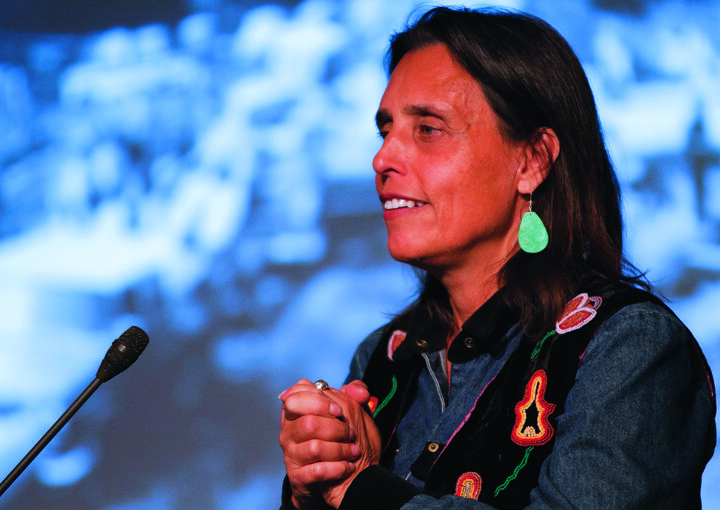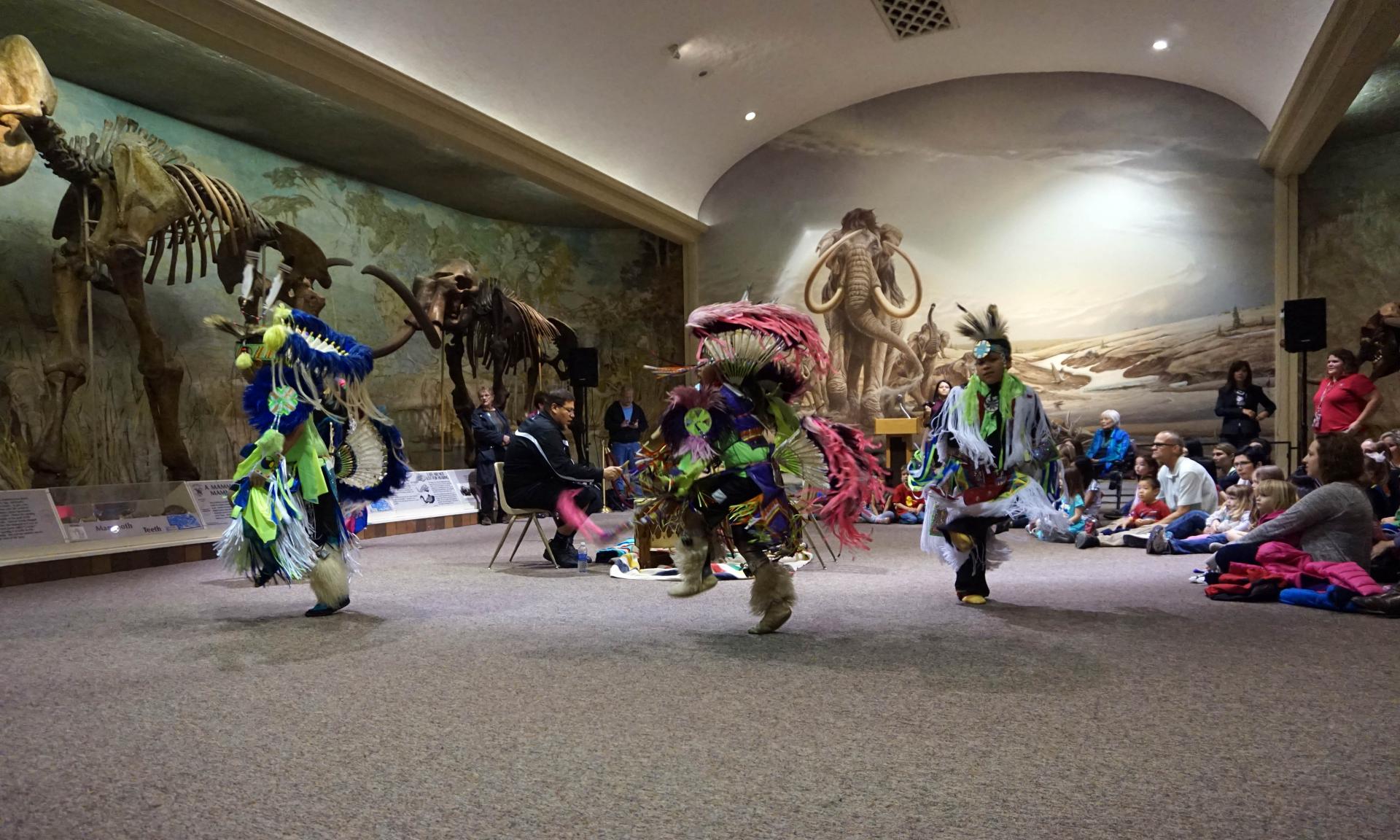Content
The 2015 Great Plains Symposium brought several important figures in the current Native American economic and cultural renewal.
The Center for Great Plains Studies at the University of Nebraska and the Nebraska Commission on Indian Affairs teamed up to bring this exceptional gathering of Native American talent to Lincoln, Neb., on May 14-15. The 2015 Great Plains Symposium “Standing Bear and the Trail Ahead” explored the status, challenges, and especially the opportunities and prospects that Native Americans and First Peoples face going forward.
Our title, Standing Bear and the Trail Ahead, plays off the local effort to create a Memorial Trail honoring Standing Bear. The Memorial Trail, a virtual experience, would follow Standing Bear’s (and the Ponca tribe’s) “removal” to Oklahoma and his unauthorized return to the Ponca homeland, where he was arrested, tried in an Omaha federal court, and famously granted the first recognition in U.S. law of Indians’ “personhood.” The relevance of Standing Bear’s story for our Symposium is that his return and vindication embody the kind of “triumph of endurance” that in a larger sense Native and First Peoples have achieved and that now places them on the threshold of renewal and revival.
Partner: Nebraska Commission on Indian Affairs
Supporters:
- The Cooper Foundation
- Humanities Nebraska
- Office of the University of Nebraska President
- Office of the University of Nebraska-Lincoln Chancellor
- Office of the UNL Senior Vice Chancellor
- UNL College of Arts & Sciences
- Korff School of Music
- UNL Office of Research and Economic Development
- Convocations Committee of the UNL Faculty Senate
- Claire M. Hubbard Foundation
- BNSF Foundation
- Mike Hemmer
Films shown:
The Cherokee Word For Water is a feature-length motion picture inspired by the true story of the struggle for, opposition to, and ultimate success of a rural Cherokee community to bring running water to their families by using the traditional concept of “gadugi" – working together to solve a problem.
Standing Bear's Footsteps is an NET production that tells the story of the Ponca Nation’s exile from Nebraska to the malaria-infested plains of Indian Territory in present-day Oklahoma.
Media coverage:
- Great Plains Symposium to Bring Native Scholars, Talent, 1/31, Indian Country Today Media Network
- Cindy Lange-Kubick: Breastfeeding, 'Sesame Street' and a sovereign right, 5/12, Lincoln Journal Star
- Editorial, 5/14, Lincoln Journal Star
- Sainte-Marie to bring eclectic rock to Kimball, 5/14, Lincoln Journal Star
- Bronze by local artist featured at symposium, 5/19, McCook Gazette
- Letter, 5/31: Nebraska must honor Native Americans, 5/30, Lincoln Journal Star
“the Trail Ahead” part of our title signals that the Symposium looked broadly at the current status and future prospects of Native peoples. There has been considerable attention (as there should be) about reservation bad news, such as high diabetes rates, joblessness, alcoholism, domestic violence, and suicide. But good news deserves telling too, and our Symposium showcased growing economic progress among Indians and the emerging Native cultural renaissance.
We see emerging evidence of the new opportunities and improving prospects in the prosperity that gaming and casinos have brought some tribes, but much more profoundly we see it in the business success of Ho-Chunk Inc. and the Winnebago tribe and in the growing entrepreneurialism the Umatilla Indian Reservation, the Eastern Shawnee, and the Hoopa Valley Tribe; we see it in the developing success of the Inter-Tribal Buffalo Council; we see it in the benefits brought by such landmark cases as the Osage land trust settlement; we see it in the escalating quality of Indian colleges and their students’ achievements; and perhaps most convincingly we see it in the accomplishments of Indian writers and artists like Louise Erdrich, William Least Heat-Moon, Chris Eyre, and others. Indeed, we may be at the front edge of a Native and First Peoples renaissance of historic proportions.
The NCIA is the state liaison between the four headquarter tribes of the Omaha, Ponca, Santee Sioux and Winnebago Tribes of Nebraska. It helps ensure the sovereignty of both tribal and state governments is recognized and acted upon in a true government-to-government relationship. The commission also serves all off-reservation Indian constituencies in the State of Nebraska. All goals of the commission are accomplished through advocacy, education and promotion of legislation.

Keynotes
WINONA LADUKE
Native American activist, environmentalist, economist, and writer, is known for her work on tribal land claims and preservation. LaDuke (above) is the executive director of the White Earth Land Recovery Project, a nonprofit that seeks to recover land for the Anishinaabeg people and develop programs for environmental preservation. You may recognize LaDuke when she was the vice presidential nominee of the Green Party of the United States in both 1996 and 2000 or from her appearance on the Colbert Report in 2008.
HATTIE KAUFFMAN
Former CBS and ABC correspondent (and first Native American national correspondent), author of memoir Falling into Place, enrolled member of the Nez Perce Tribe, spoke during the Standing Bear Breakfast
WILSON PIPESTEM
Managing Partner and co-founder of Ietan Consulting, which is “dedicated to advocacy on behalf of Indians and tribes”; enrolled member of the Otoe-Missouria Tribe
BUFFY SAINTE-MARIE
Native American folk singer, Grammy-winning songwriter, former “Sesame Street” regular, member of Cree Nation.
Speakers and Presenters
- Beatty Brasch, Executive Director, Center for People in Need, Lincoln, Neb.
- Moses Brings Plenty, actor, lead in “Cherokee Word for Water,” Oglala Lakota
- Keith Fix, chief executive officer of Blabfeed, Ponca Tribe of Nebraska
- Judi gaiashkibos, Exec. Dir., Nebraska Commission on Indian Affairs, enrolled member of the Ponca Tribe of Nebraska
- Camie Goldhammer, Founder and chair of the Native American Breastfeeding Coalition of Washington, Sisseton-Wahpeton
- Margaret Jacobs, Chancellor’s Professor of History, UNL, Bancroft Prize winner for White Mother to a Dark Race
- Winona LaDuke, author, Founding Director of the White Earth Land Recovery Project and enrolled member of the Mississippi Band Anishinaabeg
- Christine Lesiak, NET Television, producer, director, and writer of Standing Bear’s Footsteps
- Stew Magnuson, journalist and author of The Death of Raymond Yellow Thunder
- Robert Miller, author of Reservation “Capitalism:” Economic Development in Indian Country, enrolled citizen of the Eastern Shawnee Tribe
- Lance Morgan, CEO, Ho-Chunk Inc., enrolled member, Winnebago Tribe of Nebraska
- Kaci Nash, research associate and project manager, Center for Digital Research in the Humanities
- Roxanne Dunbar-Ortiz, author of The Great Sioux Nation
- James Riding In, author and scholar, Arizona State University, enrolled citizen of the Pawnee Nation of Oklahoma
- Virginia Driving Hawk Sneve, author of Standing Bear of the Ponca, enrolled member of the Rosebud Sioux Tribe
- Joe Starita, author, I Am A Man: Standing Bear’s Journey for Justice
- Jim Stone, Executive Director, Inter-Tribal Buffalo Council, enrolled member of the Yankton Sioux Tribe
- Mike Tyndall, Buffalo herd manager, enrolled member, Omaha Tribe of Nebraska
- Mark Weekly, Acting Deputy Regional Director-Midwest Region, National Park Service
- Ponka-We Victors, member of Kansas House of Representatives, enrolled member of the Ponca Tribe of Oklahoma and the Tohono O’odham Nation of Arizona
- Roger Welsch, Nebraska author, humorist, folklorist, and commentator, adopted member of Omaha Tribe of Nebraska and Tribal Friend of Pawnee
- David Wishart, Professor Geography, UNL, author of An Unspeakable Sadness
- Larry Wright, Sr., Director of Northern Ponca Buffalo Programs, enrolled member, Ponca Tribe of Nebraska
